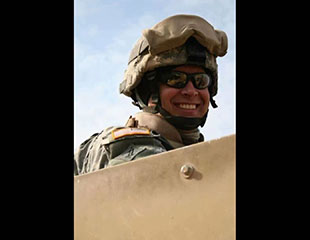Mental Health Treatment Gives These Veterans a New Start
4-minute read
Mental Health Treatment Gives These Veterans a New Start
4-minute read
For many Veterans, mental health treatment opens the possibility for new beginnings. These new beginnings can take many forms: resetting a family relationship, advancing the Veteran’s education, embarking on a new career path, finding a new purpose and more.
These fresh starts bring hope for renewal, like the inspiration brought by the beginning of a new year. The difference is that Veterans can create these new possibilities anytime, independent of the month on the calendar, by reaching out for therapy and other mental health treatments — like Veterans Tom, Michelle and Tony did.
Tom: Helping himself leads to building solutions for others

Don't be afraid to ask for help
Tom felt broken. The U.S. Army Veteran served from 1999 to 2011, including deployments to Iraq. When he came back home, it was evident something was wrong.
“My heart was pounding all the time. I was sweating for no reason, crying for no reason,” Tom says. “I didn’t sleep … I clearly would get up every couple of hours. I would check all the doors. I would check all the windows. I would check on the kids. The hyperarousal and hypervigilance were keeping me on alert and making me feel like I needed to be prepared for any kind of emergency or response.”
Medication, group therapy and exposure therapy for his anxiety and posttraumatic stress disorder (PTSD) helped Tom regain control and freed him to pursue new ambitions. He went back to school, earning a bachelor’s degree in electrical engineering so he could design devices for clients with disabilities.
“Engineers don’t just build bridges and iPhones; they can help people too,” Tom says. “Finding a way to help others with the same things that I went through, hopefully catching them before they get to my point — finding a way to get back to being a role model for my kids. They’re all great things. I can’t really ask for much more than that.”
Michelle: Finding confidence and a new mission
When Michelle joined the Air Force in 1991, she planned to remain for decades. She was following in the footsteps of her hero, her father, who served for 26 years. Michelle decided to aim for 30.
She got off to a good start, enjoying assignments and experiences in Germany and Australia. Then, while on a temporary duty assignment at a base in the U.S. for Airman Leadership School, a person working in security sexually assaulted her.
“It devastated me,” Michelle says. Her morale and confidence took another huge hit when antidepressant medications contributed to weight gain that forced her out of the military in 2002, despite her extensive efforts to diet and exercise.
One-on-one counseling and other mental health treatments after her service — including repetitive transcranial magnetic stimulation for depression and therapy for PTSD — helped Michelle regain her confidence and chart a new course. “I used to always think that everything was my fault, and I had to learn that it wasn’t my fault,” she says. “I learned that you can’t take care of anybody else until you take care of yourself.”
Michelle applied her newfound confidence to a leadership role at The Mission Continues. The nonprofit deploys Veteran volunteers to work alongside nonprofit partners and community leaders to improve educational resources, tackle food insecurity and more.
“I still have a purpose,” Michelle says. “Instead of just curling up in front of the sofa and watching Netflix and letting the world pass me by, I want to do something better with my time. I want to be a productive member of society, and I want to give back to my community.”
Tony: Opening himself up to people and new experiences
“I’m not the same person,” says Tony, a U.S. Army Veteran, of the impact of the mental health therapy he received after his service. “I’m more open to new experiences. I’m more trusting of people. I’m more accepting of people.”
“I can’t say he’s not the same person he was,” adds his wife, Katie. “But all the best parts of him have come out even better. Bulbs just started to light up for him, and he became so relaxed, so ‘go with the flow’ and easygoing.”
Tony served in the Army from 2003 to 2011, in the infantry. He was deployed on a tour in Iraq that he describes as “hell on wheels” with improvised explosive devices and other threats surrounding him. He started drinking heavily after his first tour in an attempt to escape reality and experienced panic attacks after he transitioned to civilian life.
Diagnosed with moderate to severe PTSD after seeking help at a Vet Center, Tony found cognitive behavioral therapy to be key to his healing. “It’s about identifying the ways the trauma has made you think differently, in an irrational sense. It’s very intense,” he says. “There’s homework involved and you have to relive everything, but it really does help.”
Tony cemented his progress with a nearly five-month hike on the Appalachian Trail. “It was transcendent,” he says. “You find peace, somehow.”
